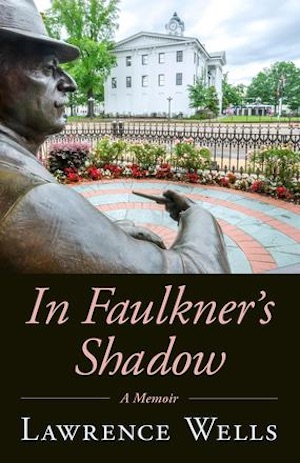By David Madden
At almost 88, when I open a book I wish to review, I never know whether I am going to read my own life between the lines.
Lawrence Wells’ In Faulkner’s Shadow: A Memoir is a startling example. Since 1988, I’ve known Larry and his late wife, Dean, and how and why they, like myself as a novelist and critic and most of the literary dramatic personae of this book, have lived in Faulkner’s monumental shadow.
In 2009, Dean Faulkner Wells, stricken with COPD, rushed to write about her own life as Faulkner’s favored niece in Every Day by the Sun, published in 2011, the year of her death. I have read both books together.
With lyric grace and wit, Larry Wells, a talented writer of fiction and nonfiction, tells the story of many writers who came to Oxford, Mississippi, to stand for a while or for a decade in Faulkner’s shadow.
Willie Morris, author of North Toward Home (1967), came to teach writing at the University of Mississippi and became a lovable but alcoholic town character.
Morris’ rival celebrity and teacher of creative writing, Barry Hannah, author of 13 celebrated works of fiction, was not so lovable, but was certainly a character, often a volatile drunk. When Larry and Dean met him at Ole Miss, Barry was playing with a Bowie knife. “I could overpower you,” he told his host, Larry, “and take your woman.”
Soon after Faulkner’s death, nurturing Dean and affable Larry supported an emerging literary community in Oxford.
As one of his last acts as editor at Harper’s, Willie assigned me to cover the trial of the liberal novelist Jesse Hill Ford, who had killed a black soldier who had trespassed on his property.
Because my review of Barry’s first novel Geronimo Rex (1972) was both positive and negative, I dreaded meeting him, but he thanked me and praised it often, as he did a dramatic reading of one of my stories.
But the person Larry and Dean talk about in their memoirs who haunts me is Joan Williams, Faulkner’s “protégé and paramour” who had published works of fiction before she died in 2004 of alcoholism. I met her at Square Books in Oxford. We became friends. Drawing upon her correspondence with Faulkner, I wrote a play with my student Missy Wilkinson, a novelist, about their romance, and we performed it several times.
In both their memoirs, Larry and Dean tell fascinating stories from fresh perspectives about Faulkner and members of his family, especially his mother, Maud, and his youngest brother, Dean, and friends among the town folks. Maud was unforgiving. She hung a sign—“DON’T COMPLAIN, DON’T EXPLAIN”—above a door in her house. It was Faulkner who gave his younger brother Dean the airplane in which he crashed four months before Dean was born. Faulkner adopted her and became her legal guardian.
Dean’s very difficult mother Louise, Faulkner’s daughter Jill, his wife Estelle and her daughter by a previous marriage, are among the many other people about whom Larry offers anecdotes of sometimes outrageous behavior.
A gracious hostess, Dean took my hand and placed it on the dining room table in Faulkner’s mother’s house. “This is where Pappy finished Absalom, Absalom.” Thinking I was one of the few to thrill to that moment, I learned that Willie, Barry, William Styron, Larry Brown, Winston Groom, Irwin Shaw, and George Plimpton, among many others, also had experienced that memorable ritual.
David Madden is the author of 11 novels and 4 collections of stories, the latest of which is Marble Goddesses and Mortal Flesh. Revising Fiction delineates his advocacy for an emphasis upon the craft of fiction. His most recent work is The Voice of James M. Cain: An Innovative Biography.




